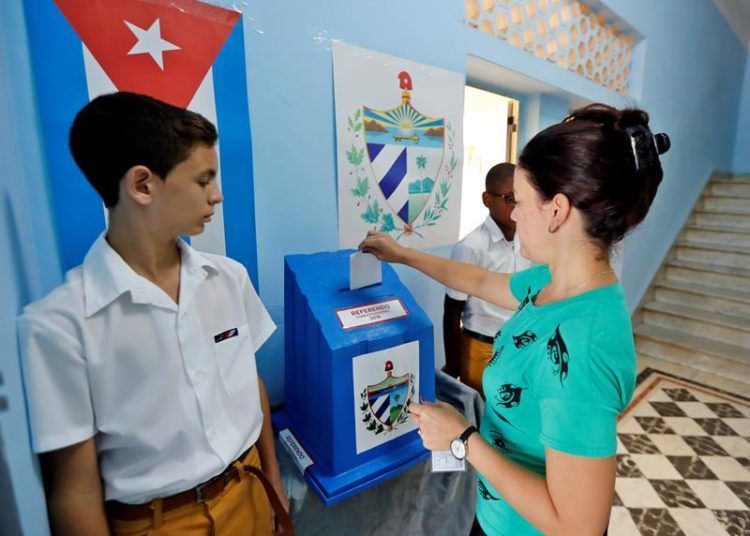Cubans went to the polls this Sunday, in a day without incidents, but with more polarization than usual, to decide on the new Constitution that does not modify the political system or the communist aspirations but expresses the timid economic and social opening of the last decade.
Out of the more than 8 million registered voters ̶ out of a population of 11.2 million ̶ more than 7.5 million (81.5%) had already voted at 5:00 pm (19:00 GMT), one hour before the polls closed, according to data released by the National Electoral Commission.
The president of the Commission, Alina Balseiro, described as “favorable” the latest participation data, 3% higher than the parliamentary elections of March 2018, although the result of the vote will not be known until today Monday at around 3:00 pm local time (20.00 GMT).
A process of this type was not held in Cuba since 1976, when the current Magna Carta was voted, a text tailored to then President Fidel Castro and the times of the Cold War and which was endorsed by 97% of the voters, with a 2% abstention.
For many, beyond the debate on the new Constitution, this referendum serves as a barometer to shed light on the support for the government led by Miguel Díaz-Canel, who replaced Raúl Castro in April 2018, and it is also the first time in decades that Cubans have the real option of choosing “no” on an election ballot.
In line with the expressions of all the representatives of the ruling party in recent weeks, Díaz-Canel took for granted yesterday morning that citizens will support a text that “furthers the rights for all” and “formulates a socialist state of law.”
“I am convinced that the majority of Cubans will vote yes for Cuba, for the country, for the Revolution and for the future,” the president told reporters after casting his vote in an electoral college in western Havana.
In the same area, according to images shown by state television, the former president and leader of the Communist Party of Cuba (PCC), 87-year-old Raúl Castro, who has chaired the commission writing up the new constitutional text, also voted.
Although everything suggests that the “yes” will win by a wide margin, the arrival of the Internet through 3G on cell phones has led to a bitter battle on the social media between the representatives of the ruling party, in favor of the Constitution, and its detractors, who have called for rejecting it or abstaining in the referendum.
The propaganda for the “yes” jumped in the last few weeks from the social media to the streets in the form of posters, on bus screens, profusely in the state media and even in the ATM receipts.
The situation has been unprecedented in a country that claims to have proscribed political campaigns and had its last episode on the same day of the voting, when several independent digital media and critics of the government woke up to see they had been blocked from within the island, according to what they reported.
The final draft of the new constitution submitted for consultation is made up of 229 articles, 11 titles, two special, 13 transitory and two final provisions.
The final draft of the text is the result of a popular consultation process that lasted three months and in which Cubans living abroad participated for the first time, although this segment of the population has not been allowed to vote and only Cuban diplomats and workers on missions have done so from abroad.
As a result of the citizens’ debate, 760 amendments were incorporated to the text, which means that 60% of the first draft was modified.
The new Cuban Constitution maintains the Communist Party (PCC) as “society’s highest leading force” and ratifies communism as an aspiration, even though that term had been eliminated in the first draft of the constitutional reform.
As new elements it recognizes private property, considers foreign investment as necessary, establishes the figures of the President of the Republic and the Prime Minister, and establishes a limit of two consecutive presidential terms.
Also modified was the controversial article that opened the door to same-sex marriage and, with respect to freedom of the press, it states that in no case will the fundamental means of communication be subject to private property.
The constitutional referendum also took place against the background of the convulsive crisis in Venezuela, Cuba’s main ally, and with relations with the United States at their lowest moment, since Washington accuses the island of supporting the government of Nicolás Maduro, something that Havana rejects.
White House National Security Advisor John Bolton on Sunday described the Cuban referendum as “another ploy of the Cuban regime to cover up its repression and tyranny.”










